Is Faith Opposed to Science?
To learn more about our church, visit www.clearcreek.org. Follow us on social media:
Facebook – www.facebook.com/clearcreek.org
Instagram – www.instagram.com/clearcreekcommunitychurch
Twitter – www.twitter.com/_cccc
To learn more about our church, visit www.clearcreek.org. Follow us on social media:
Facebook – www.facebook.com/clearcreek.org
Instagram – www.instagram.com/clearcreekcommunitychurch
Twitter – www.twitter.com/_cccc
As a child Rick Scheuring had dreams of becoming a doctor, but he also had a love of space. He could have never imagined being able to combine those two passions into one profession as he does today. Currently he is NASA’s Lead Flight Surgeon for astronaut Drew Morgan (also a member of Clear Creek Community Church). Rick and Michelle have been married for 26 years and have five children. In this interview, Ryan Lehtinen sits down with Rick to talk about how his career in the sciences has grown his faith in Jesus and love for the Bible, and how his work gives him opportunities to share the good news of the gospel with those around him.
RESOURCES:
Faith & Science Resources
Faith & Science (message series)
In this episode, we continue our conversations around the “Here’s My Issue” message series, discussing questions that people have about faith, God, or the church. Ryan Lehtinen sits down with Yancey Arrington and Lance Lawson to discuss the question, doesn’t science disprove the claims of Christianity?
RESOURCES:
Faith & Science Resources
Faith & Science (message series)
The Reason For God by Timothy Keller
Growing up on a farm in northeast Kansas bolstered Nate Fisher with good morals, a hard work ethic, and some spiritual understanding, as his mom regularly took him and his sister to church in the small town nearby.
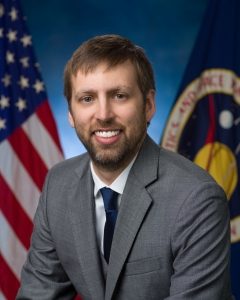
Official NASA Portrait for Flight Dynamics Division (CM) – Nate Fisher. Photo Date: July 11, 2018. Location: Building 8, Room 183 – Photo Studio. Photographer: Robert Markowitz
“What I took away from my family was that to get through life, you want to be a productive person and not a weight on society and culture,” 33-year-old Nate said.
Nate also lived by the idea that while you are working to provide for yourself, you should also treat your neighbors well. To an extent, Nate believed that if he treated others well, then they would approve of him and, in turn, treat him well, and that all of this would lead to happiness in life.
Instead it led to a chaotic life with sporadic highs and crushing lows that included depression.
“My self-value was anchored in my performance at work and my perception of what others thought about me,” Nate said.
But that anchor didn’t hold.
As a kid, Nate was always interested in science. With hopes of becoming an astronaut, he pursued an engineering degree at Kansas State University. However, as he studied science, he found it difficult to reconcile the latest theories—how old the universe is, what stuff it is made up of, how our solar system came to be—with the Bible stories he had heard about growing up.
“When I came to college, I started drifting away from any kind of religious values that I did have. I perceived religious people to be very two dimensional, always putting on a happy-go-lucky persona, and whitewashing all the bad things in the world.”
Nate’s vision in life was to finish college, get an internship, and get a job. Towards the end of his college career, he landed himself a multi-semester internship with NASA Johnson Space Center, which then led to a post-college job offer. Once he got the job, his focus then became working hard and saving up money for retirement. But his flight operations job was very competitive and, while he wasn’t the bottom performing person, he also wasn’t the top performer. Once again, he had to prove his worth and gain other people’s approval through his performance. After finally passing his first certification, Nate’s immediate future seemed secure. But all his hard work didn’t pay off with the contentment he’d hoped for. All the while, Nate was slipping further into depression.
“I remember sitting at my desk at the house I was renting and realizing, So I’ll work for a while. Maybe I’ll get married, maybe not. I’ll eventually retire. Maybe I’ll move back to Kansas, maybe not. I’ll keep hanging out with friends, and then I’ll die, and the universe will continue to exist without me.And I remember thinking, Wow. That really sucks. What’s the point of all this suffering? Sometimes you’re happy, but most of the time you’re not. What’s the point of all of this? It just seemed like a gigantic waste of time.”

Within the next month of having that conscious thought, Nate was invited to a Bible study and to church by three different people: a friend from work, his roommate, and a cute girl named Rachel.
“I thought it was kind of funny. I had just been wondering about the point of life, and then all of this happened. It was very surreal. It seemed like the universe was telling me to do this.”
So Nate decided to pursue faith again.
“I went to the Bible study that my good friend was starting, and I also went to church with Rachel, because she was much cuter than my dude roommate.” That church happened to be Clear Creek Community Church. It was 2013 when Nate started attending on and off for the next year-and-a-half.
Through studying the New Testament book of John in the small group, and listening to the sermon series at church, Nate began to see a greater purpose than simply living, working and dying .
“I slowly came to the conclusion that life isn’t all terrible things. There are good things to it, too. It started to make sense that serving Christ, becoming a member of his church, doing what he tells us to do, living the way he tells us to— really his whole message— that is the real point of life. It’s not just this gigantic chaotic thing that just sucks at the end. It’s actually really beautiful.”
After studying John, his small group read through Genesis, and Nate began making connections between the Old and New Testament histories and the more he studied, the more his preconceived ideas began to be challenged. It even opened up the possibility that science and the Bible aren’t mutually exclusive.
“The more I learn about science just points me to the beauty of creation. God made an incredibly ordered world and studying the world and physics is just another form of worship. Diving into all the little details and learning about it only increases his magnificence.”
Nate got baptized and a few months later started dating the cute girl, Rachel, who had originally invited him to church. They eventually married, and now Nate currently volunteers with the technical arts team, running the sound board at the Egret Bay campus.
But just because he became a Christian didn’t instantly take away his struggles.
“One of my biggest preconceived ideas when I was a kid was that if you were a Christian, your life is perfect and everything goes your way and you’re happy all the time.”
While it’s not as deep-seated as before, Nate stills struggles with wanting other people’s approval to give him a sense of worth.
But, instead of focusing on doing what he needs to do to make other people feel good, and mostly looking to his performance and productivity at work for personal self-worth, Nate has started to replace that with what the Bible tells us about where we should find our self-worth.
“My highs and lows aren’t as big as they used to be, because now I find my self-worth is grounded in something different than it was before.”
He has made a practice of taking the time to get up earlier than he really needs to go to work to read his Bible — not just to read the words and go, but read it slowly and think about what the words actually mean.

“If I can start my day off that way, then it gives me the tools to try to enter into the various things that happen to me during the day and attack it with the right point of view such that I can do my best to honor God.”
While Nate claims it’s no silver bullet, he finds that studying the Bible daily does help to keep him in the right mindset.
“This world can seem chaotic and crazy and full of badness that seems to go unchecked, but all of that will be made right one day,” Nate said. “We have to trust in a power that’s bigger than ourselves. The creator of the universe obviously has the power to do what he wants. So there’s a reason all of this is happening. Even if we don’t understand it, that doesn’t mean that the reason doesn’t exist.”
This is a modest list of resources for further study into issues of faith and science. This is by no means exhaustive but hopefully a fair representation of the different interpretive views within orthodox Christianity. As previously stated in our ‘Faith & Science’ series, CCCC doesn’t hold to a specific interpretive position. With that said, the listing of resources here is not an endorsement (indeed, these works disagree with each other). On the contrary, we encourage you do the work both personally and in community in order to discover which of these resources makes best sense of the two books of God: his Word and his World. It should also be noted that descriptions were taken from other sources such as the publishers.
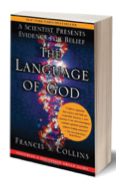
The Language of God: A Scientist Presents Evidence for Belief by Francis Collins is for believers, agnostics, and atheists alike. The Language of God provides a testament to the power of faith in the midst of suffering without faltering from its logical stride. Readers will be inspired by Collin’s personal story of struggling with doubt and faith and as well as his experiences as a genetics researcher with discussions of science and spirituality, especially centering around evolution.
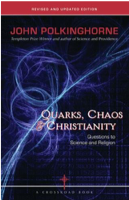
Quarks, Chaos & Christianity: Questions to Science and Religion by Sir John Polkinghorne draws on discoveries made in atomic physics to make credible the claims of Christianity, and helps refine Christian perceptions through the knowledge that the new science brings. He discusses belief in God, chaos, evolution, miracles, and prayer, and gives an answer to the question: Can a scientist believe?
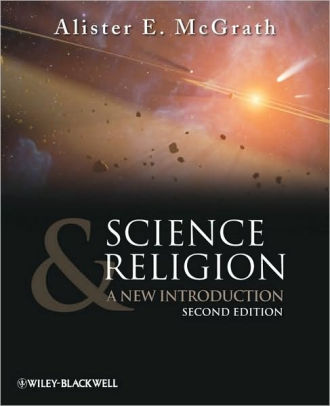
Science and Religion: A New Introduction by Alister McGrath. This popular textbook introduces readers to the central questions in the field of science and religion. Ideally suited to those who have little or no prior knowledge in either area, it examines the historical, theological, philosophical and scientific aspects of the interaction between religion and science. Takes a topic-based approach which fits into the existing structure of most courses, and includes explanatory material not found in other works of this kind, making it highly accessible for those with little scientific or religious background knowledge.
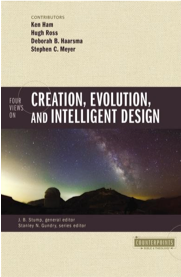
Four Views on Creation, Evolution, and Intelligent Design by Ken Ham, Hugh Ross, Deborah B. Haarsma, and Stephen Meyer. Presents the current “state of the conversation” about origins among evangelicals representing four key positions: 1) Young Earth Creationism – Ken Ham (Answers in Genesis), 2) Old Earth (Progressive) Creationism – Hugh Ross (Reasons to Believe), 3) Evolutionary Creation – Deborah B. Haarsma (BioLogos), 4) Intelligent Design – Stephen C. Meyer (The Discovery Institute). The contributors offer their best defense of their position addressing questions such as: What is your position on origins – understood broadly to include the physical universe, life, and human beings in particular? What do you take to be the most persuasive arguments in defense of your position? How do you demarcate and correlate evidence about origins from current science and from divine revelation? What hinges on answering these questions correctly?
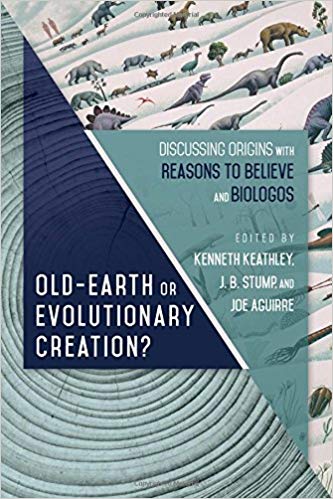
Old Earth or Evolutionary Creation?: Discussing Origins with Reasons to Believe and BioLogos by Kenneth Keathley (Editor). Christians confess that God created the heavens and the earth, but they are divided over how God created and whether the Bible gives us a scientifically accurate account of the process of creation. Representatives of two prominent positions – old earth creation (Reasons to Believe) and evolutionary creation (BioLogos) – have been in dialogue over the past decade to understand where they agree and disagree on key issues in science and theology. This book is the result of those meetings that touches on many of the pressing debates in science and faith, including biblical authority, the historicity of Adam and Eve, human genetics and common descent, the problem of natural evil, and methodological naturalism. Old Earth or Evolutionary Creation? invites readers to listen in as Christian scholars weigh the evidence, explore the options, and challenge each other on the questions of creation and evolution. In a culture of increasing polarization, this is a model for charitable Christian dialogue.
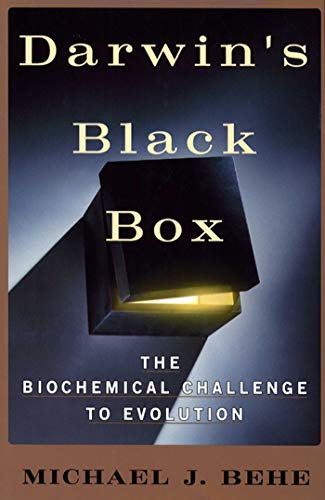
Darwin’s Black Box by Michael J. Behe helped to launch the intelligent design movement: the argument that nature exhibits evidence of design, beyond Darwinian randomness. It sparked a national debate on evolution, which continues to intensify across the country. From one end of the spectrum to the other, Darwin’s Black Box has established itself as the key intelligent design text — the one argument that must be addressed in order to determine whether Darwinian evolution is sufficient to explain life as we know it.
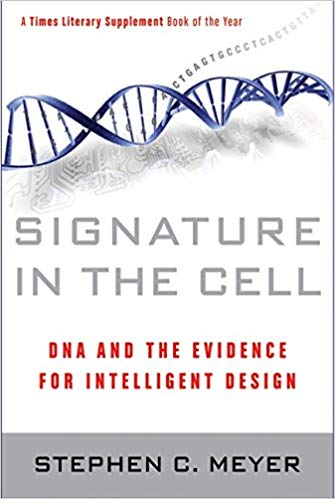
The Signature in the Cell by Dr. Stephen C. Meyer. Meyer presents a convincing new case for intelligent design (ID), based on revolutionary discoveries in science and DNA. Along the way, Meyer argues that Charles Darwin’s theory of evolution as expounded in The Origin of Species did not, in fact, refute ID.
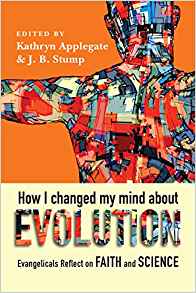
How I Changed My Mind About Evolution: Evangelicals Reflect on Faith and Science by Applegate and Stump (Editors). Many evangelicals have come to accept the conclusions of science while still holding to a vigorous belief in God and the Bible. How did they make this journey? Here are the stories of 25 people who have come to embrace evolution and faith, including Francis Collins, Scot McKnight, John Ortberg, James K.A. Smith, Jennifer Wiseman, and N.T. Wright.
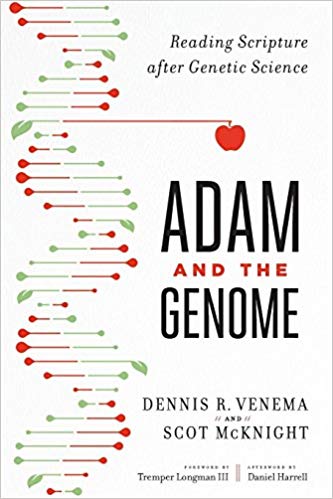
Adam and the Genome: Reading Scripture After Genetic Science by Dennis Venema and Scott McKnight. Genomic science indicates that humans descend not from an individual pair but from a large population. What does this mean for the basic claim of many Christians: that humans descend from Adam and Eve? Leading evangelical geneticist Dennis Venema and popular New Testament scholar Scot McKnight combine their expertise to offer informed guidance and answers to questions pertaining to evolution, genomic science, and the historical Adam. The authors address up-to-date genomics data with expert commentary from both genetic and theological perspectives, showing that genome research and Scripture are not irreconcilable. It should be noted that some readers found Venema’s first half of the book sounder than McKnight’s conclusions in the second half.
A person does not need to look too far before they are faced with the puzzling mystery of how everything on this earth and in our solar system and out in the universe works together in such ordered fashion. The beauty of science and creation is clearly seen all around us— if we are looking.
Tia Fink is a scientist and professor of environmental science at Lee College. She attended many churches growing up that had either very human-centered views of religion or very corporate views of religion. The focus was either on what humans should or should not be doing to please God or how a person would be blessed to the degree that they were willing to empty their pocketbooks on a Sunday morning. Both these unbiblical and damaging approaches left Tia with a distaste for God, church, and any kind of religion. She decided to become an atheist.
“I was just happy letting everyone believe what they wanted to believe,” Tia said.
In 2004, when Tia was 20 years old, a work friend invited her to visit Clear Creek Community Church. While the fill-in-the-blank sermon notes were pleasantly non-threatening, and the people seemed friendly, Tia stopped going after only a few weeks.
“I liked the fill-in-the-blank worksheets a lot,” Tia admitted, “but at that time, I just didn’t want to attend and didn’t think any of it was important.”
Sometimes people would talk to Tia about church and God, and her responses varied between ‘I don’t get it,’ ‘No, that’s not for me,’ and ‘Never again am I trying that.’
“There were other times when people really wanted to know what I thought, and I would say, ‘Well, everyone believes in some sort of “higher power,” no matter what name they called it.’ For the most part though, sometimes I would recognize that maybe there was a higher power, but that he doesn’t care at all because this world is so messed up and evil. But because of all the evil in the world, I believed that God didn’t exist at all, neither did Satan, neither heaven nor hell.”
Years later, this approach to life was no longer working for her. She and her husband found themselves in a huge financial bind that led to depression and eventual separation from one another.
“Within four months, I lost my husband and all my earthly possessions,” Tia recalled. “I thought we were still going to work things out, so I let him have anything he wanted from the house.” But then it turned out she had nothing left.
At that rock-bottom point, Tia had another co-worker who noticed that she was really struggling. He told her, “If you’re looking for answers, the Bible is where you could find them.” Although she was very skeptical, she had nowhere else to turn and she did need help. So in either a moment of courage or desperation (or maybe both), she asked him where she should start. Tia finally started her journey of truly discovering whether or not God was really real, and if he was, how he could possibly care about her life.

Tia began reading both the Old Testament and the New Testament at the same time. And being a scientist, any time she came across verses that didn’t make sense or that she disagreed with (or even ones that she didn’t like), she put on her research hat and started digging.
“I’m not one that if I read something, if it totally doesn’t make sense, I’m just going to move on and leave it alone,” Tia said. “I would research, ‘Why? Why would God do that?’ There were some very interesting parts that, from my standpoint, just seemed horrible and cruel. But when I researched the background for them and why they happened, it started to make sense why God would choose to want things done that way or allow certain things to happen.”
Her year-long process of excavating the truths underneath the scriptures led to a true discovery of what the Bible really said about God. This also led her to read supplemental books at the same time she was reading through the Bible. She was looking for answers to explain some of the most challenging topics she encountered both in the Bible and in her personal life: Why does God allow horrible things to happen? Where is God during my suffering? What does it mean that God is sovereign?
When Tia was reading through the Bible, she was looking for answers for her situation, but she wasn’t seeing those. Originally, she didn’t know you could look in the Bible about marriage, or divorce, or finances.
“I think the way I approached [reading the Bible] helped me have a bigger picture of it all, versus just looking at my current situation.”
Eventually, Tia came to faith after reading about the nature of God, Jesus, and her own need for a savior. She realized God wanted his people to worship him and him alone when she read about the pagan concrete idol Dagon in 1 Samuel that broke to pieces and bowed face down before the Ark of God and His presence. She realized Jesus was the only pathway to a right relationship with God when she read his words in John 14 that he was “the way, the truth, and the life.” She realized that because of God’s great love for the world, expressed in John 3, Jesus’ life was given up as a sacrifice for the sins of man. And when she read Romans 3, she realized that no one was good on their own and she needed this savior, Jesus, too.
The scriptures even revealed the kind of person she wanted to become because of her newfound faith in Jesus. She wanted to be like the deep-rooted trees planted along the riverbank that Jeremiah spoke about because these were the trees that never stopped producing fruit and could withstand heat and drought without worry. And she wanted to be like the wise person who builds their house on solid rock from the parable that Jesus told in Matthew because the person who builds their house on bedrock could withstand any amount of rain and wind and floodwaters.
It was clear to Tia that Jesus, who was both the living water and the rock of her salvation, was the answer to her circumstances. It wasn’t that the heat or drought or the rain, wind, or floods in her life would necessarily cease, but that her faith in Jesus would ground her to no end. It was only after these revelations that Tia decided to check out church again.
“This process of fact-checking the Bible also led me to fact-check some local churches, too, and I think that was unbelievably helpful,” Tia said. “I first started by watching some online sermons… and I found myself saying, ‘That’s not true!’ or ‘That’s not what the Bible teaches! Why are they teaching this to people?’”
Then she remembered Clear Creek Community Church and the fill-in-the-blank sermon notes. She started watching many archived sermons and decided to attend in person again. Tia even fact-checked Clear Creek messages. But after finding them to be biblically accurate, she knew she had found a church she could trust.
Tia has now been attending CCCC for over two years. She joined her current small group in February 2018. She serves on Sundays with the high school student ministry. And she is still a scientist.
“I feel like I understand everything in science better,” Tia said. “We know a lot of things [about our world], which is great. God gives us the knowledge to know these things. The what, the when, the where, and the why are pretty much mostly answered up to this point. But most of the time, scientists are so reluctant to put in the who.”
However, it seems that even the intelligent design of our solar system challenges this reluctance. The simple fact that our planet has an orbit keeps us from crashing directly into the sun. Our specific orbit keeps us from crashing into other planets. And Jupiter is so delicately positioned to act as a sort of shield for the earth, deflecting harmful gases and asteroids that might otherwise be bound for Earth [Opfer, 2015].
 “You can read all these scientific things and you can see how the world works and the physics and the chemistry and the environmental science and the biology, but there’s always these holes, like these gaps of what we don’t know.”
“You can read all these scientific things and you can see how the world works and the physics and the chemistry and the environmental science and the biology, but there’s always these holes, like these gaps of what we don’t know.”
The who, Tia explains, is the one who so carefully created both the parameters of the universe and the very atoms that make up a unit of matter.
“Subatomic particles and the strength of gravity appear to be finely tuned just right to support stars, atoms, molecules, and life,” Tia said. “Scientists believe if the Big Bang conditions had been slightly different, then the universe would not exist (Johnson, 2003).
“Or just take neutrons and protons as an example. Neutrons are just slightly heavier than protons. If it were the other way around, atoms couldn’t exist because all the protons in the universe would have decayed into neutrons shortly after the big bang. No protons, then no atomic nucleuses, no atoms, no chemistry, no life,” Tia claims. “Saying that God doesn’t exist in that is pretty much setting yourself up for more failure than understanding.”
At the same time that her understanding of the created world amplified, so did her compassion for her friends and her scientist colleagues who still do not believe. For Tia, choosing to believe in God within a community of atheists can be challenging, at times. Sometimes when presented with opposing discussions with friends or colleagues, she has to say, “I understand where you’re coming from, but that’s not what I’m gonna believe anymore. I’m going to be over here believing this, but if you ever have questions, I’ll tell you anything you want to know.”
“All you can do is try to share the gospel with them sometimes, and share with them in a gentle way so that they’re not going to be hostile towards it. But it’s not our work to do. It’s God’s work to save them.”
On top of these challenges, Tia’s personal circumstances—the ones that drove her to seek answers in the Bible in the first place—have not changed much at all. And yet, somehow, everything has changed. While Tia began her spiritual journey hoping for a restored marriage, along the way she found a new perception that God didn’t just exist, but he knew her by name, he was writing her story, and she could trust him.
“As you read through the Bible, there is all sorts of devastation; we’re not the first people to have war and famine and adultery and everything else,” Tia said. “Lots of people in the Bible had to learn how to be content. I’m sure they didn’t want to be in prison. I’m sure lots of God’s people didn’t want to have all the bad things happen to them that happened to them. I’m sure they didn’t like those situations at all, but He allowed it to happen—and it was still for their good, somehow.”
In the quest to be content in her circumstances, Tia admits that putting these truths into her mind and soul daily is the main thing that keeps her moving forward.
“If you look at the big picture, God’s sovereign over all of it, even from the grass growing to the condition of the soil to every drop of rain. So if He sees and controls all that, what makes you think that he doesn’t see and know and control your circumstances? Because He does.”
References:
Opfer, C. (2015). What If Earth Changed Its Orbit. Retrieved from
https://science.howstuffworks.com/science-vs-myth/what-if/what-if-earth-changed-its-orbit.htm
Johnson, G. (2003) Can Science Prove the Existence of God? Retrieved from https://www.nytimes.com/2003/11/11/science/can-science-prove-the-existence-of-god.html